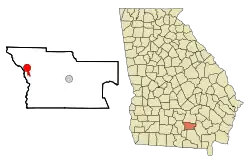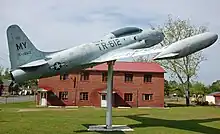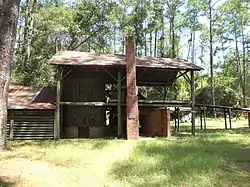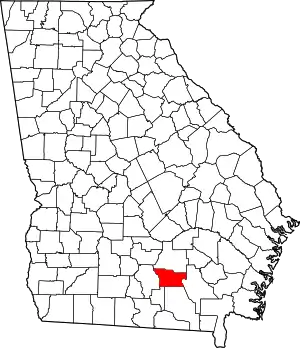Willacoochee, Georgia | |
|---|---|
 Willacoochee City Hall and Police Department | |
| Motto: Where good people live | |
 Location in Atkinson County and the state of Georgia | |
| Coordinates: 31°20′7″N 83°2′47″W / 31.33528°N 83.04639°W | |
| Country | United States |
| State | Georgia |
| County | Atkinson |
| Incorporated | November 12, 1889 |
| Area | |
| • Total | 3.82 sq mi (9.90 km2) |
| • Land | 3.82 sq mi (9.89 km2) |
| • Water | 0.00 sq mi (0.00 km2) |
| Elevation | 240 ft (73 m) |
| Population (2020) | |
| • Total | 1,240 |
| • Density | 324.61/sq mi (125.33/km2) |
| Time zone | UTC-5 (Eastern (EST)) |
| • Summer (DST) | UTC-4 (EDT) |
| ZIP code | 31650 |
| Area code | 912 |
| FIPS code | 13-82972[2] |
| GNIS feature ID | 0333429[3] |
| Website | www |
Willacoochee is a city in Atkinson County, Georgia, United States, along the Alapaha River. The population was 1,391 at the 2010 census,[4] and 1,240 in 2020.[5]
History
The Georgia General Assembly incorporated Willacoochee as a town in 1889.[6] Willacoochee is a name derived from the Creek language meaning "home of the wildcats".[7]
Geography
Willacoochee is located at 31°20′7″N 83°2′47″W / 31.33528°N 83.04639°W (31.335175, -83.046381).[8]
According to the U.S. Census Bureau, the city has a total area of 3.8 square miles (9.9 km2), all land.[4]
Demographics
| Census | Pop. | Note | %± |
|---|---|---|---|
| 1890 | 398 | — | |
| 1900 | 471 | 18.3% | |
| 1910 | 960 | 103.8% | |
| 1920 | 1,211 | 26.1% | |
| 1930 | 1,006 | −16.9% | |
| 1940 | 903 | −10.2% | |
| 1950 | 987 | 9.3% | |
| 1960 | 1,061 | 7.5% | |
| 1970 | 1,120 | 5.6% | |
| 1980 | 1,166 | 4.1% | |
| 1990 | 1,205 | 3.3% | |
| 2000 | 1,434 | 19.0% | |
| 2010 | 1,391 | −3.0% | |
| 2020 | 1,240 | −10.9% | |
| U.S. Decennial Census[9] | |||
| Race | Num. | Perc. |
|---|---|---|
| White (non-Hispanic) | 500 | 40.32% |
| Black or African American (non-Hispanic) | 423 | 34.11% |
| Native American | 5 | 0.4% |
| Pacific Islander | 2 | 0.16% |
| Other/Mixed | 28 | 2.26% |
| Hispanic or Latino | 282 | 22.74% |
As of the 2020 United States census, there were 1,240 people, 529 households, and 291 families residing in the city,[5] down from 2010's 1,391.[4] Among its population in 2020, 40.32% were non-Hispanic white, 34.11% Black or African American, 0.4% Native American, 0.16% Pacific Islander, 2.26% multiracial, and 22.74% Hispanic or Latino of any race.
In media
In The Steve Harvey Show, gym teacher Cedric Jackie Robinson's mother owned land in Willacoochee.
In the movie Renaissance Man, Mark Wahlberg's character, "Tommy Lee Haywood," was from Willacoochee, mispronounced as "Wallahoochie" by Danny Devito's character.
In the movie Jungle Fever, Rev. Purify (played by Ossie Davis), Flipper Purify's (played by Wesley Snipes) father, makes reference to being born in Willacoochee.
In the movie Beauty Shop, a customer, Mrs. Towner made a reference to Willacoochee while spelling out her name. Humorist Lewis Grizzard talked about the No Name Bar in Willacoochee.
In Love Victor, high school students Victor Salazar and Benji Campbell (played by Michael Cimino (actor) and George Sear, respectively) took a road trip to Willacoochee to have an espresso machine repaired by a shop in Willacoochee, which was the only place they could repair this specific espresso machine.
Photos
 A Lockheed T-33 in Willacoochee. A T-33 crashed here ca. 1960s. Located 31°20'28.7"N 83°02'52.1"W(31.341306,-83.047806)
A Lockheed T-33 in Willacoochee. A T-33 crashed here ca. 1960s. Located 31°20'28.7"N 83°02'52.1"W(31.341306,-83.047806) McCranie's Turpentine Still, just west of Willacoochee, on the National Register of Historic Places
McCranie's Turpentine Still, just west of Willacoochee, on the National Register of Historic Places Signs indicating drainage divide
Signs indicating drainage divide
References
- ↑ "2020 U.S. Gazetteer Files". United States Census Bureau. Retrieved December 18, 2021.
- ↑ "U.S. Census website". United States Census Bureau. Retrieved January 31, 2008.
- ↑ "US Board on Geographic Names". United States Geological Survey. October 25, 2007. Retrieved January 31, 2008.
- 1 2 3 "Geographic Identifiers: 2010 Demographic Profile Data (G001): Willacoochee city, Georgia". U.S. Census Bureau, American Factfinder. Archived from the original on February 12, 2020. Retrieved May 6, 2013.
- 1 2 3 "Explore Census Data". data.census.gov. Retrieved December 14, 2021.
- ↑ Acts Passed by the General Assembly of Georgia. J. Johnston. 1889. p. 1006.
- ↑ Nestor, Sandy (May 7, 2015). Indian Placenames in America. McFarland. p. 50. ISBN 978-0-7864-9339-5.
- ↑ "US Gazetteer files: 2010, 2000, and 1990". United States Census Bureau. February 12, 2011. Retrieved April 23, 2011.
- ↑ "Census of Population and Housing". Census.gov. Retrieved June 4, 2015.
